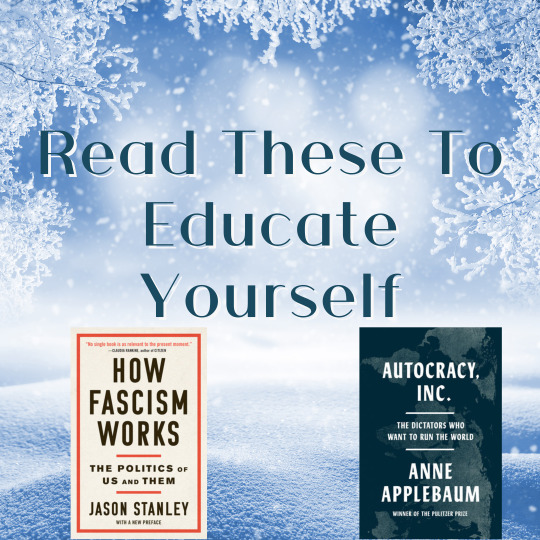#Autocracy Inc.
Explore tagged Tumblr posts
Text
« All of us have in our minds a cartoon image of an autocratic state. There is a bad man at the top. He controls the army and the police. The army and the police threaten the people with violence. There are evil collaborators, and maybe some brave dissidents. But in the twenty-first century, that cartoon bears little resemblance to reality.
Nowadays, autocracies are run not by one bad guy but by sophisticated networks relying on kleptocratic financial structures, a complex of security services— military, paramilitary, police—and technological experts who provide surveillance, propaganda, and disinformation. The members of these networks are connected not only to one another within a given autocracy but also to networks in other autocratic countries, and sometimes in democracies too. Corrupt, state-controlled companies in one dictatorship do business with corrupt, state-controlled companies in another. The police in one country may arm, equip, and train the police in many others. The propagandists share resources—the troll farms and media networks that promote one dictator’s propaganda can also be used to promote another’s—as well as themes: the degeneracy of democracy, the stability of autocracy, the evil of America. »
– Journalist and historian Anne Applebaum at Substack quoting from her soon to be released book Autocracy, Inc..
You can read several more paragraphs from Autocracy, Inc. at the Substack link above. Her book will be published on the 23rd; if you're within distance of Washington, DC she will be doing a free book reading and Q&A on Friday July 26th at Politics and Prose. She's a good writer and speaker. I've read two of her previous books and can vouch for their quality.
The war in Ukraine is not some remote conflict that idiots like J.D. Vance or Neville Chamberlain might dismiss out of stupidity. Ukraine is just one arena in a worldwide clash between liberal democracy and kleptocratic tyranny.
#anne applebaum#liberal democracy#autocracy inc.#axis of autocrats#liberal democracy vs. tyranny#stand with ukraine#vladimir putin#viktor orbán#xi jinping#kim jong-un#ali khamenei#donald trump#axis of kleptocrats#kleptocratic dictatorships#invasion of ukraine#владимир путин#добей путина#علی خامنه ای#김정은#习近平#союз постсоветских клептократических ватников#агрессивная война россии#слава україні!#героям слава!#election 2024#vote blue no matter who
68 notes
·
View notes
Text
youtube
Regimes Around the World Are Starting to TEAM UP (w/ Anne Applebaum) | Shield of the Republic
Anne's new book Autocracy Inc: The Dictators who Want to Run the World.`
Oct 6, 2024 Shield of the Republic Podcast Eric and Eliot welcome back Anne Applebaum, Pultizer and Duff Cooper Prize Winning author of Gulag and Red Famine and currently staff writer with The Atlantic and senior fellow at the Agora Institute at Johns Hopkins University School of Advanced International Studies. They discuss Anne's new book Autocracy Inc: The Dictators who Want to Run the World. They examine the threat that autocratic regimes represent to their own citizens at home and to liberal democracy abroad, the West's slowness to recognize the threat that the authoritarians represent, the excessive optimism that (after the end of the Cold War and with the advent of globalization) liberal democratic ideals would triumph without recognizing the danger that authoritarian, illiberal ideas might flow into democracies, whether or not the authoritarians think they are winning and how they measure success, Russia's role in prompting much of the authoritarian offensive and the role of western institutions in facilitating the emergence of Russia as a personalist, authoritarian mafia state, the weaknesses of the authoritarians and how the western democracies might go on the offensive against the political warfare being waged daily by the authoritarians against the democracies, and the effort to obliterate truth and promote hopelessness and cynicism in citizens in democracies and setting them against one another. Autocracy, Inc.: The Dictators Who Want to Run the World: https://a.co/d/ifaCL3E Shield of the Republic is a Bulwark podcast co-sponsored by the Miller Center of Public Affairs at the University of Virginia.
1,831 Comments
The Dictators Who Want to Run the World, with Anne Applebaum (Part 1)
Intelligence Squared
`````````````````````````````````````````````````````````````````````138K views 1 month ago``````````````````````````````````````````````````````````````````````````````````````````````````````````````````````````````````````````````````````````````````````````````````````````````````````````````````````````````````138K views 1 month ago`````````````````````````````````````````````````````````````````````````````````````````````````````````````````````````````````````````````````````````````````````````````````````````````````````````````````````````````````
1,831 Comments
3 notes
·
View notes
Text
"What the autocrats — whether they're in American politics or in Russian politics or in Chinese politics — what they want is for you to be disengaged. They want you to drop out," she says. "I want people to be convinced that ideas matter, that we're going to have to defend and protect our political system if we want to keep it."
"Constant lies also create this kind of cynicism and apathy. It's a way of keeping people out of politics and preventing civic engagement. I mean, a lot of these authoritarian states know that … [the] biggest threat to their power is their own people. And so their goal is to prevent people from ever organizing, from ever being engaged, from ever caring at all. And one of the ways they do that is through this constant stream of lies that make people feel like they're simply unable to know anymore what's true and what's not." - NPR
#People Have The Power#Fighting Dictators#Fighting Autocracy#Autocracy Inc.#Anne Applebaum#WUTC 88.1 FM#National Public Radio#NPR interview#Standing Up To Lies#Standing Up To Autocracy#Standing Up To Dictators#Get Up And Do Something#Standing Up To Disinformation
0 notes
Text
Autocracy, Inc.: The Dictators Who Want to Run the World (Anne Applebaum, 2024)
"The political scientist Lisa Wedeen has observed that the Syrian regime tells lies so ludicrous that no one could possibly believe them, for example that Syria, at the height of the civil war, was an excellent tourist destination.
These “national fictions,” she concluded, were meant not to persuade anyone, but rather to demonstrate the power of the people who were spinning the stories.
Sometimes the point isn’t to make people believe a lie; it’s to make people fear the liar.
This too marks a departure from the past. Soviet leaders also lied, but they tried to make their falsehoods seem real.
Like Khrushchev at the UN, they became angry when anyone accused them of lying, and in response they produced fake “evidence” or counterarguments.
In Putin’s Russia, Assad’s Syria, or Maduro’s Venezuela, politicians and television personalities often play a different game.
They lie constantly, blatantly, obviously. But when they are exposed, they don’t bother to offer counterarguments.
When Russian-controlled forces shot down Malaysia Airlines Flight 17 over Ukraine in 2014, the Russian government reacted not only with a denial but with multiple stories, plausible and implausible: they blamed the Ukrainian army, or the CIA, or a nefarious plot in which 298 dead people were placed on a plane in order to fake a crash and discredit Russia.
This tactic, the so-called “fire hose of falsehoods” produces not outrage but nihilism.
Given so many explanations, how can you know what actually happened? What if you can never know?
If you can’t understand what is going on around you, then you are not going to join a great movement for democracy, or follow a truth-telling leader, or listen when anyone speaks about positive political change.
Instead, you will avoid politics altogether.
Autocrats have an enormous incentive to spread that hopelessness and cynicism, not only in their own countries, but around the world."
6 notes
·
View notes
Text
Yes. The answer is "Yes." We are sleepwalking into autocracy. However, more than half of us weren't asleep at all and were yelling about it at the top of our lungs. At least we'll have free gas and cheap eggs in our Brave New World.
1 note
·
View note
Text

#mace windu#batman 89#anne applebaum#john jackson miller#steven barnes#the glass abyss#batman resurrection#autocracy inc#autocracy
1 note
·
View note
Text
Recommended January Reading




A reminder that reading is political and powerful.
Pick up a book to learn, buy a book to support your community, and donate a book to the neighborhood (or suggest it for your bookclub) that might shift someone's opinion.
Books For Self-Education:
How Fascism Works by Jason Stanley
Autocracy, Inc by Anne Applebaum
Book by Indie Queer Authors
Transverse by Jamie Winters
Tears in the Water by Margherita Scialla
Written With Pride edited by Fable Tethras, Viveca Shearin, & Claudine Griggs
Or a gazillion other queer books
Books To Subtle Encourage Your Neighbors to Read
The Children of Men by PD James
The Handmaid's Tale by Margaret Atwood
Firebreak by Nicole Korhner-Stace
Any others you can think of, but famous books or subtle books work best for this category I've noticed
Feel free to build the list!
#reading#books#book rec#booklr#writeblr#writers#writing community#reading is resistance#queer books#queer community#queer and here#indie authors
169 notes
·
View notes
Text
2025 Women’s Prize for Non-Fiction Longlist
Autocracy, Inc.: The Dictators Who Want to Run the World by Anne Applebaum
Embers of the Hands: Hidden Histories of the Viking Age by Eleanor Barraclough
The Eagle and the Hart: The Tragedy of Richard II and Henry IV by Helen Castor
A Thousand Threads by Neneh Cherry
The Story of a Heart by Rachel Clarke
Raising Hare by Chloe Dalton
Ootlin by Jenni Fagan
Why Fish Don’t Exist: A Story of Loss, Love and the Hidden Order of Life by Lulu Miller
Agent Zo: The Untold Story of Fearless WW2 Resistance Fighter Elżbieta Zawacka by Clare Mulley
By the Fire We Carry: The Generations-Long Fight for Justice on Native Land by Rebecca Nagle
Wild Thing: A Life of Paul Gauguin by Sue Prideaux
What the Wild Sea Can Be: The Future of the World’s Ocean by Helen Scales
The Peepshow: The Murders at 10 Rillington Place by Kate Summerscale
Sister in Law: Fighting for Justice in a System Designed by Men by Harriet Wistrich
Tracker by Alexis Wright
Private Revolutions: Coming of Age in a New China by Yuan Yang
20 notes
·
View notes
Quote
One of the voices in the film is Anne Applebaum, a journalist and historian, who’s an essential guides to this present moment. Her latest book, Autocracy Inc, lays out comprehensively but simply how networked autocracies and countries with autocratic features are with one another. These are political and financial technological alliances that link Russia to China to Venezuela to Iran. Anne’s point is that the bad guys are helping each other out all the time in all sorts of ways. And we’re watching a new US-UK axis being built in real time between Farage and Musk. Wendy Siegelman, a brilliant open-source investigator who had a career in corporate finance before becoming a one-woman kleptocracy exposure machine and who has been a hugely valuable resource and ally helping with my investigations over the years, posted this week about a disturbing new company she’d found.
ChatGPT v The Guardian - by Carole Cadwalladr - The Power
8 notes
·
View notes
Text

Anne Applebaum is brilliant. A leading expert on the evolutionary cycles of dictatorships, democracies, tyranny, and authoritarianism.
Read her new book, “Autocracy Inc.”
16 notes
·
View notes
Text
Anne Applebaum's book Autocracy, Inc.: The Dictators Who Want to Run the World was published a few days ago. in the book she describes the basic nature of contemporary autocracies and how they cooperate with each other.
About two-thirds of the way through this NPR audio she pivots from overseas autocracies to talk about how disinformation and outright lies are undermining democracy in the US.
The transcript for the audio can be found here.
A few bits from the transcript:
You know, for a long time, certainly since the end of the Cold War gave us this feeling that our political system was the best and it was inevitably the best, we took for granted the idea that somehow, you know, information was like - was another free market. And there would be a competition in the market between good ideas and bad ideas, and eventually the good ideas would win. That's actually not how it works. And that's not how the news business works anymore. It's not how information works. And understanding how important it is and how important it is to engage in it, both in our country and around the world, I think would do us a lot of good. I mean, we - you know, we sort of stopped competing or - again, out of complacency, out of the assumption that everybody would eventually agree with us, we didn't really have to do anything. We didn't have to try very hard. I think we misunderstood that. [ ... ] I want people to be convinced that ideas matter, that we're going to have to defend and protect our political system if we want to keep it. We have to do that around the world, but we also have to do it in our own country. So much of what I suggest is to do with changing the way things are done in the United States. And much of it is also to do with people becoming engaged in public life, in understanding what's happening, and not just voting, but participating. With autocrats, whether they're in American politics or in Russian politics or in Chinese politics, what they want is for you to be disengaged. They want you to drop out. They want you to become overwhelmed, and they want you to, you know, to say, I can't do anything. It's all hopeless. So it's very important to remember that our ideas are better. And our system is better, and however flawed it may be - and I'm sure you could do another whole radio program about the flaws of the United States and our democracy - it's still better than the autocratic world. And I should also say, it's still the case that our ideas are the ones that people in the autocratic world wish they had. The people who are really the most eloquent spokesmen for freedom of speech aren't the kind of free speech warriors in America. They're Russians who don't have it. And the people who are the greatest advocates for transparency in the rule of law are also people who live in states where they don't have it. And remembering that these are things that we have that they're under threat, and they need to be protected and defended, I think is extremely important.
We fight autocracy by being engaged and by challenging disinformation.
The book is brand new. Here's a link to the publisher's site for Autocracy, Inc.. Take note of the title and author's name and then buy it at a local independent bookstore. 😉
Autocracy, Inc.: The Dictators Who Want to Run the World
@npr
#liberal democracy vs. autocracy#anne applebaum#npr#stand with ukraine#autocrats#tyrants#autocracy inc.#dictators#kleptocrats#vladimir putin#xi jinping#kim jong-un#ali khamenei#nicolás maduro#aleksandr lukashenko#bashar al-assad#viktor orbán#invasion of ukraine#владимир путин#путлер#союз постсоветских клептократических ватников#аляксандр лукашэнка#علی خامنه ای#김정은#بشار الأسد
40 notes
·
View notes
Text
youtube
Autocracy, Inc: Anne Applebaum and Ruth Ben-Ghiat in Conversation
The 92nd Street Y, New York
An important conversation from July.
Autocracy, Inc.: The Dictators Who Want to Run the World by Anne Applebaum
8 notes
·
View notes
Text
'Autocracy, Inc.' review: Democracies, dictators battle for the new world order : NPR
2 notes
·
View notes
Text
Autocracy, Inc.: The Dictators Who Want to Run the World (Anne Applebaum, 2024)
"Russians hear even less about what happens in their own towns or cities.
Instead, they are told constantly about the decline of places they don’t know and have mostly never visited: America, France, Britain, Sweden, Poland, countries apparently filled with degeneracy, hypocrisy, and Russophobia.
A study of Russian television from 2014 to 2017 found that negative news about Europe appeared on the three main Russian channels, all state controlled, an average of eighteen times a day.
Some of the stories were obviously invented (European governments are stealing children from straight families and giving them to gay couples!), but even true stories were cherry-picked to support the idea that daily life in Europe is frightening and chaotic, that Europeans are weak and immoral, and that the European Union is either dictatorial and interventionist or, alternatively, about to fall apart.
The goal is clear: to prevent Russians from identifying with Europe, as Russians once did.
If anything, the portrayal of America has been more dramatic.
Americans who rarely think about Russia would be stunned to learn how much time Russian state television devotes to America’s culture wars, especially arguments over gender.
Putin himself has displayed an alarmingly intimate acquaintance with Twitter debates about transgender rights, mockingly sympathizing with people who he says have been “canceled.”
In part this is to demonstrate to Russians that there is nothing to admire about the liberal democratic world.
But this is also Putin’s way of building alliances between his domestic audiences and his supporters in Europe and North America, where he has a following on the authoritarian far right, having convinced some naive conservatives that Russia is a “white Christian state.”
In reality, Russia has very low church attendance, legal abortion, and a multiethnic population containing millions of Muslim citizens.
The autonomous region of Chechnya, which is part of the Russian Federation, is governed in part by elements of sharia law and has arrested and killed gay men in the name of Islamic purity."
5 notes
·
View notes
Text
As Turkey approaches presidential and parliamentary elections on May 14, President Recep Tayyip Erdogan is fighting an uphill battle for survival. He is behind in the polls, which can be attributed to three main reasons.
First, Erdogan can no longer rely on his autocratic bargain predicated on delivering economic growth and upward mobility in return for political support or quiescence. This served him well during most of his 20 years in power but now is irreparably broken.
His stubborn and uninformed monetary policy has left the economy fragile and suffering from high inflation. A major erosion of purchasing power generating growing poverty and income disparity ensued in the last couple of years. But the bad news for Erdogan does not end with the economy.
Second, and perhaps most important, a traditionally weak and divided opposition is now united against him. An eclectic coalition of six parties, boosted with the support of a kingmaker Kurdish political movement, stands firmly behind Kemal Kilicdaroglu, the leader of the social-democratic Republican People’s Party and the candidate of what is known as the Nation Alliance.
Kilicdaroglu is ahead of Erdogan in the polls, but his margin is slim.
Finally, a third factor also works against Erdogan: the massive earthquake that shook Turkey on February 6 and killed more than 50,000 people. The disaster blatantly exposed the inefficiency and institutional decay under Erdogan’s one-man rule.
To the massive frustration of millions affected, the state was quasi-absent in the immediate aftermath of the disaster. Under the corrupt management of incompetent cronies, governmental agencies not only failed in search and rescue efforts but also mismanaged post-disaster relief.
Under normal circumstances these factors should translate into a major defeat for the ruling Justice and Development Party (AKP). Yet elections are no longer free and fair in Erdogan’s Turkey. The government controls most of the media and the judicial system.
In the absence of a strong margin of victory for the opposition, Erdogan may refuse to concede and take the result to the courts or worse – to the streets.
Lacking charisma and oratory skills but with a strong reputation for integrity, Kilicdaroglu, 74, is the architect of the opposition’s newly acquired unity. But he has a losing streak against Erdogan.
In a two-round presidential election system that is bound to be tightly contested, whether Kilicdaroglu can win in the first round with more than 50% of the vote will end up depending on an unknown: the resurgent candidacy of Muharrem Ince, who has emerged as a populist disrupter, to the delight of Erdogan. Ince, who polls between 5% and 7%, attracts younger voters unhappy with both the AKP and the opposition.
Given the stakes, the whole country is on edge. A large part of the population is ready for change. But the same societal segment is anxious and incredulous about the prospect of Erdogan losing power.
Aura of invincibility
Like many observers in the West who lack confidence in Turkey’s democratic maturity, many in Turkey find it hard to believe that Erdogan will quietly disappear after losing an election. This brings us to a critically important yet often misunderstood dimension of the drama about to unfold in Turkey: Erdogan’s biggest advantage is his aura of political invincibility.
There seems to be a fatalistic resignation that Erdogan will find a way to stay in power and that a peaceful transition will prove elusive. The same alarmism sees this election as the last chance before Turkey slides into dictatorship.
Such apprehension may serve to galvanize the opposition. But it is misplaced and ignores reality. Erdogan is not as strong as he seems and Turkey is not an autocracy like Russia or China where polls are cosmetic.
Despite the illiberal nature of strongman rule, elections will continue to matter if Turkish people are not intimidated by Erdogan. Even if he manages to win, the people and the opposition should remain vigilant, make sure the result is not manipulated before conceding, and prepare for the next fight instead of losing hope and faith in elections.
Turkish democracy will outlast Erdogan even if he scores a pyrrhic short-term victory. He is bound to lose even if he wins.
Finally, let’s not forget that Erdogan lost local elections in all major cities in 2019 when the opposition was united and received Kurdish support. In Istanbul, a 16-million-strong megapolis and a microcosm of Turkey, Erdogan refused the result after a very narrow loss and bullied his way to a rerun.
He lost in a landslide.
And all this was before the economic meltdown and the hyperinflation of the last two years. Behind the facade of his massive presidential palace, Erdogan is a lonely man, detached from reality, and surrounded by sycophants.
Yes, he has gained a well-deserved reputation as a Machiavellian survivor after 20 years in power. But centralization of decision-making, personalization of authority, and the hollowing out of state institutions have not made him stronger.
Instead, Turkey’s strongman is now at his weakest. If Erdogan wins on May 14, it will not be because of his capacity to govern or his populist policies raising the minimum wage or lowering the retirement age. It will be because too many Turks still believe he is invincible.
3 notes
·
View notes
